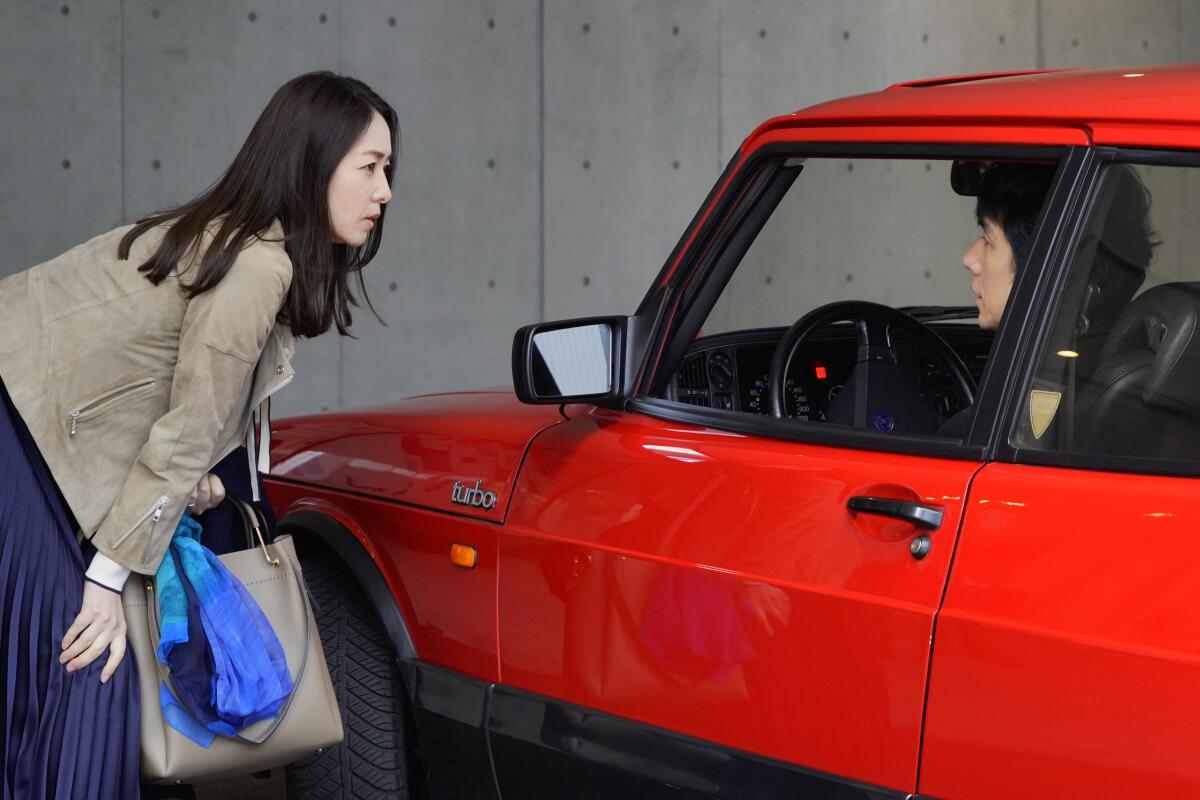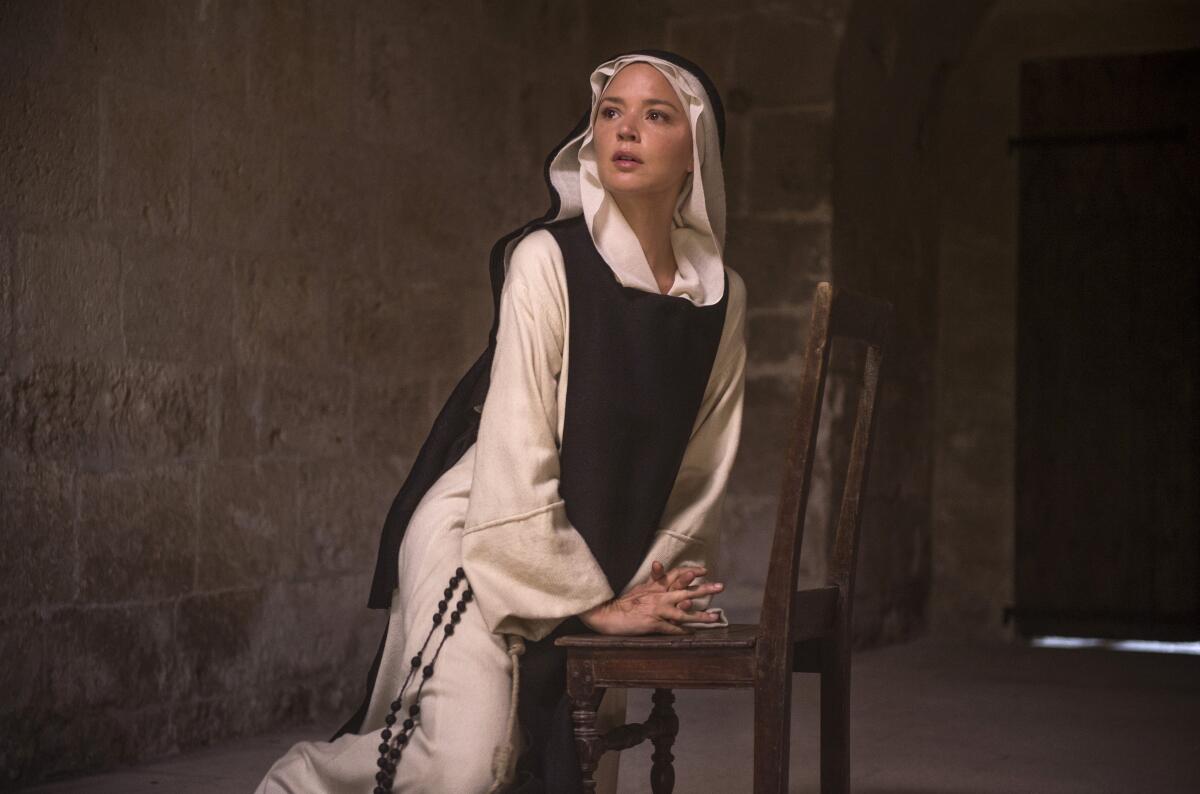Take a spin with Japan’s Oscar entry, ‘Drive My Car’
Hello! I’m Mark Olsen. Welcome to another edition of your regular field guide to a world of Only Good Movies.
Only good movies
Get the Indie Focus newsletter, Mark Olsen's weekly guide to the world of cinema.
You may occasionally receive promotional content from the Los Angeles Times.
Jane Campion’s “The Power of the Dog,” a commanding examination of masculinity and its discontents starring Benedict Cumberbatch, Kirsten Dunst and Jesse Plemons — a film we covered here a few weeks back — is still in theaters and is now streaming on Netflix. Former Times critic Kenneth Turan makes a welcome return with his interview with the filmmaker, the two of them chatting on a park bench on a sunny afternoon.
Campion spoke about how the new film is her first to focus on a male main character, though it wasn’t intentional. “Why would I now go in this direction?” she asked. “For the first time in my life since my time in Cannes with ‘The Piano,’ there are so many more women in this space doing some of the best work out there. We’ve crossed over the line, and everyone wants to be on our side. No one is saying, ‘That’s too hard for women.’ The Berlin Wall is down, and it’s not coming back again.”
I spoke to Dunst for the season premiere of the Envelope podcast. She talked about her character, Rose, who marries a man played by Plemons only to be psychologically tortured by his brother, played by Cumberbatch. As she said, “I think Rose is a very old part of myself that I had to rehash of just feeling really bad about myself, or allowing myself to feel bad about myself, because of other people’s comments or control. … I think that in your early 20s, it’s very easy to get swayed into different things or thinking about yourself in a certain way, especially when you’re putting yourself out there as an actress, and you’re in a public light. So, there are definitely things I can relate to in terms of feeling really badly about yourself.”
Subscribe wherever you get your podcasts.
Dasha Nekrasova, who’s a co-host of the popular and controversial “Red Scare” podcast and can be seen on “Succession,” makes her feature directing debut with “The Scary of Sixty-First.” She’s also a co-writer and co-star of the film. It’s now playing in an exclusive 35 mm run at the American Cinematheque at the Los Feliz 3, and Nekrasova will be appearing for Q&As on Friday and Saturday nights.
The film is a wild mix of conspiracy theories and psychosexual freakouts as two young women learn the amazing-deal apartment they have moved into was once owned by disgraced financier and convicted sex offender Jeffrey Epstein. This leads them into a world of the powerful and possibly the paranormal, as Nekrasova pays homage to Italian giallo thrillers and Stanley Kubrick’s “Eyes Wide Shut.” Noel Murray reviewed the film for The Times, saying, “It’s hard not to be impressed by the sheer level of ambition in writer-director Dasha Nekrasova’s debut feature, ‘The Scary of Sixty-First.’ … But grand ideas don’t automatically produce great cinema.”
I spoke to Nekrasova when the film premiered earlier this year at the Berlin International Film Festival, where it won the prize for best first feature. On why she drew upon the death of Epstein as inspiration, Nekrasova said, “Living in New York, it felt like a huge deal. And the way that the Epstein stuff sort of touched on a larger conversation around the ruling class, I guess I thought it was really interesting and compelling. It was born out of a kind of helplessness I felt in the face of these unfathomable powers and echelons of power.”
Enjoying this newsletter? Consider subscribing to the Los Angeles Times
Your support helps us deliver the news that matters most. Become a subscriber.
‘Drive My Car’
Japan’s entry for the international feature Oscar, Ryûsuke Hamaguchi’s “Drive My Car” is an adaptation of a Haruki Murakami short story that won the screenplay award at this year’s Cannes Film Festival and was just named best film of the year by the New York Film Critics Circle. (The script is co-written by Hamaguchi and Takamasa Oe.) In the film, Hidetoshi Nishijima is Yûsuke, an actor and theater director who is married to Oto (Reika Kirishima), a playwright. When he takes a job that requires him to have a driver, Misaki (Tôko Miura), their long drives together set off a series of revelations. The film is Hamaguchi’s second to be released this year, after “Wheel of Fortune and Fantasy.” “Drive My Car” is playing at L.A.’s Nuart Theatre, with Hamaguchi making appearances over the weekend.
For The Times, Justin Chang wrote, “Perfectly paced, intricately structured and entirely absorbing, ‘Drive My Car’ is a movie about love and grief, full of winding journeys and unplanned connections. It’s also a story about storytelling, in which art and life don’t imitate so much as embrace each other, becoming intimate, ultimately indistinguishable bedfellows. … [Hamaguchi is] examining the contours of a marriage that, as with every marriage, only its participants can ever truly understand. Scene by scene, there’s more going on in any five minutes of ‘Drive My Car’ than in some movies in their entirety; it just happens to unfold, like real life, at a more serene clip and a lower volume.”
For the New York Times, Manohla Dargis wrote, “Hamaguchi’s touch — delicate, precise, restrained, gentle — overwhelms in increments. His reserve is essential to his visual and narrative approach but also feels like a worldview. Things happen, though often quietly, creating a flowing, crystalline ordinariness that, in its very naturalness and in its lack of dramatic inflection, strengthens the realism. He keeps tears and drama in check, letting emotion seep in after the heavy blow and in the meaningful silences which, like the negative space of a painting, complete the picture. In time, all that feeling becomes an inundation in a movie that formally embraces and perfectly distills Chekhov’s observation that ‘When a man spends the least possible number of movements over some definite action, that is grace.’”
Carlos Aguilar will have an interview with Hamaguchi for The Times that will be published soon. In the meantime, for RogerEbert.com he wrote, “In the delicate, patient touch of Hamaguchi’s directing, characters cease to be idealized confections made of words and ideas on the page of a scribe. Their transmutation into the bodies of the cast members happens by osmosis, it appears, to impart not patronizing wisdom but an empathetic revelation that feels lived-in. A thoughtful and tearful ride in which the destination is a spiritual confrontation with oneself, ‘Drive My Car’ devastates and comforts through its vehicular poetry of the sorrow from which we run, the collisions that awaken us, and the healing gained from every bump in the road.”
For Time, Stephanie Zacharek wrote, “The movie is tender like a rainstorm: only in the aftermath, after you’ve allowed time for its ideas to settle, does its full picture become clear. It’s the kind of movie that makes everything feel washed clean, a gentle nudge of encouragement suggesting that no matter how tired you feel, you can move on in the world.”

‘Benedetta’
Directed and co-written by Paul Verhoeven, “Benedetta” is a follow-up to 2016’s “Elle” and marks another late-career triumph for the stylish provocateur. A serious scholar of Christ — he co-authored a book on his life — Verhoeven nevertheless brings an irreverence and wit to his study of Catholicism and the patriarchy. In the new film, based on a true story, a 17th century nun named Benedetta (Virginie Efira) gains notoriety for her spiritual visions as she begins a passionate affair with another nun, Bartolomea (Daphne Patakia). The supporting cast includes Charlotte Rampling and Lambert Wilson. The film is playing in limited release.
For The Times, Justin Chang wrote, “The assumption of ‘Benedetta,’ by turns transgressive and matter-of-fact, is that sexual and spiritual epiphanies can be cut from the same cloth. Two things can coexist. Three things can coexist, if the concept of the trinity is to be believed … (and, full disclosure, I think it is). Verhoeven, now 83 and still operating with his trademark slipperiness of theme, tone and genre, treats ‘Benedetta’ itself as a demonstration of this principle. Is it a takedown of religious patriarchy, an act of cinematic blasphemy or a sincere portrait of Christian devotion? A love story, a history lesson, a psychothriller or a sex farce? Si to all of the above — or, rather, oui. (It’s an Italian-set drama but a French production.)”
For Vulture, Rachel Handler interviewed lead actresses Efira and Patakia. Handler is one of my favorite interviewers. And the conversation is both fun and insightful. Efira explained her relationship to Verhoeven’s work before shooting a small role in his previous film “Elle”: “I was fascinated after seeing ‘Basic Instinct’ and ‘Showgirls’ by the way he knows how to tell a story in the Hollywood way and then transgress it. The way that Sharon Stone or Nomi, all of his female characters, were dominating the sexual territory was so great. They’re not strong women — because I don’t like this cliché — just complex women. Bad and good at the same time.”
For Tribune News Service, Katie Walsh wrote, “Bodies, plainly presented in all their pain and glory, have long been a subject of Verhoeven’s cinematic fascinations, from ‘Showgirls’ to ‘Starship Troopers,’ and recently, he’s explored the darker, more taboo side of sexual politics, in ‘Black Book’ and ‘Elle.’ All of these ideas come together in the anarchic ‘Benedetta,’ a sexually frank, unruly, and, at times, unapologetically funny nunsploitation flick, cloaked in the aesthetic of a prestige historical drama. … Verhoeven so thoroughly tears down the church in ‘Benedetta,’ presenting a utopian counter vision of an unbridled and sensual feminine spirituality as an alternative to its patriarchal hypocrisy, that it’s no wonder the film has attracted protests from Catholics, which means he’s definitely doing something right.”
For the Playlist, Jessica Kiang wrote, “But if the knowing, kitschy approach gets him off the hook, it also counts as Verhoeven playing it relatively safe. In an age where most mainstream filmmakers still pull their punches about faith like they’re thinking of running for office someday and may need to court the Evangelical right, it’s refreshing to get a dose of the Dutch trickster’s unambiguous insistence on religious belief as an inherently lunatic, absurd thing. … If ‘Benedetta’ is a joke that Verhoeven is in on, and that is designed to play to those in on it too, we can at least be thankful that it’s a good joke — not that there’s anyone up there to be thankful to.”

‘The Hand of God’
Paolo Sorrentino’s “The Hand of God” won the Silver Lion at this year’s Venice International Film Festival and is Italy’s selection for the international feature Oscar. A coming-of-age story based on Sorrentino’s childhood, the film is set in 1980s Naples and follows a young man named Fabietto (Filippo Scotti) as he grapples with family, identity, tragedy and his intense fandom of soccer star Diego Maradona. The film is in limited release and begins streaming on Netflix on Dec. 15. Sorrentino will appear at the American Cinematheque’s Aero Theatre on Dec. 10 as part of a series on his films.
For The Times, Robert Abele wrote, “Coming-of-age movies can be about the One Lesson or the many. Sorrentino, however, would prefer you take in the ’80s-era journey of distracted adolescent Fabietto Schisa (Filippo Scotti), a scrawny kid in a big family, as a gliding, swerving travelogue of humor and heartache, visions and sounds, minus any overriding moral instruction in how anyone is supposed to grow up. Partly that’s due to Sorrentino having a notoriously wandering sensibility about What It All Means — image reigns, stimulation rules, story can wait. But it’s also a reflection of how fate works on the mind of one looking back at defining incidents and essential figures. Details do more for him in painting the picture than adhering to a prism of reason.”
For the Envelope, Gregory Ellwood spoke to Sorrentino, who said of the response to the film, “I was very relieved that the movie was well-received, because, obviously, this is a movie that is very dear to my heart, and it is the most important movie I’ve ever made. I was very happy when I realized I was reaching the goal I set out for myself. And that was that I wanted to have people be moved and touched and relieved. Especially for young people, because in many cases, young people can have the idea that their day-to-day life is so hard that there is no future. They only see darkness, but the future is there.”
For the Washington Post, Ann Hornaday wrote, “While Sorrentino assembles his players over the first hour of ‘The Hand of God,’ things seem to be building to a promising conclusion; the turning point, when it comes, is appropriately shocking. But over the next hour, the encounters and coincidences that clearly mean so much to him simply happen — they don’t land with palpable impact. The film loses momentum and the specifics of the filmmaker’s youthful longing, grief and self-discovery feel solipsistic rather than universal. For all its beauty and poignancy, ‘The Hand of God’ suffers from a strange paradox: It goes on too long but somehow doesn’t go far enough.”
For the Guardian, Xan Brooks wrote, “I’m glad that Sorrentino has got this film out of his system. I’m impressed that it’s emerged so full of bawdy vigour; still raw in the retelling and spiced with delicious set pieces. Is it redundant to worry that he’s too close to the material? His account of adolescence at times feels adolescent itself, replete with garish caricatures and crude sexual politics. It’s a story that Sorrentino has spun around real events, a creative response to disaster, with himself at the centre and everybody else in his orbit. He’s crawled through the mire. He’s survived and he’s prospered. He now gets to print his own legend 10-foot high on the screen.”

Only good movies
Get the Indie Focus newsletter, Mark Olsen's weekly guide to the world of cinema.
You may occasionally receive promotional content from the Los Angeles Times.




